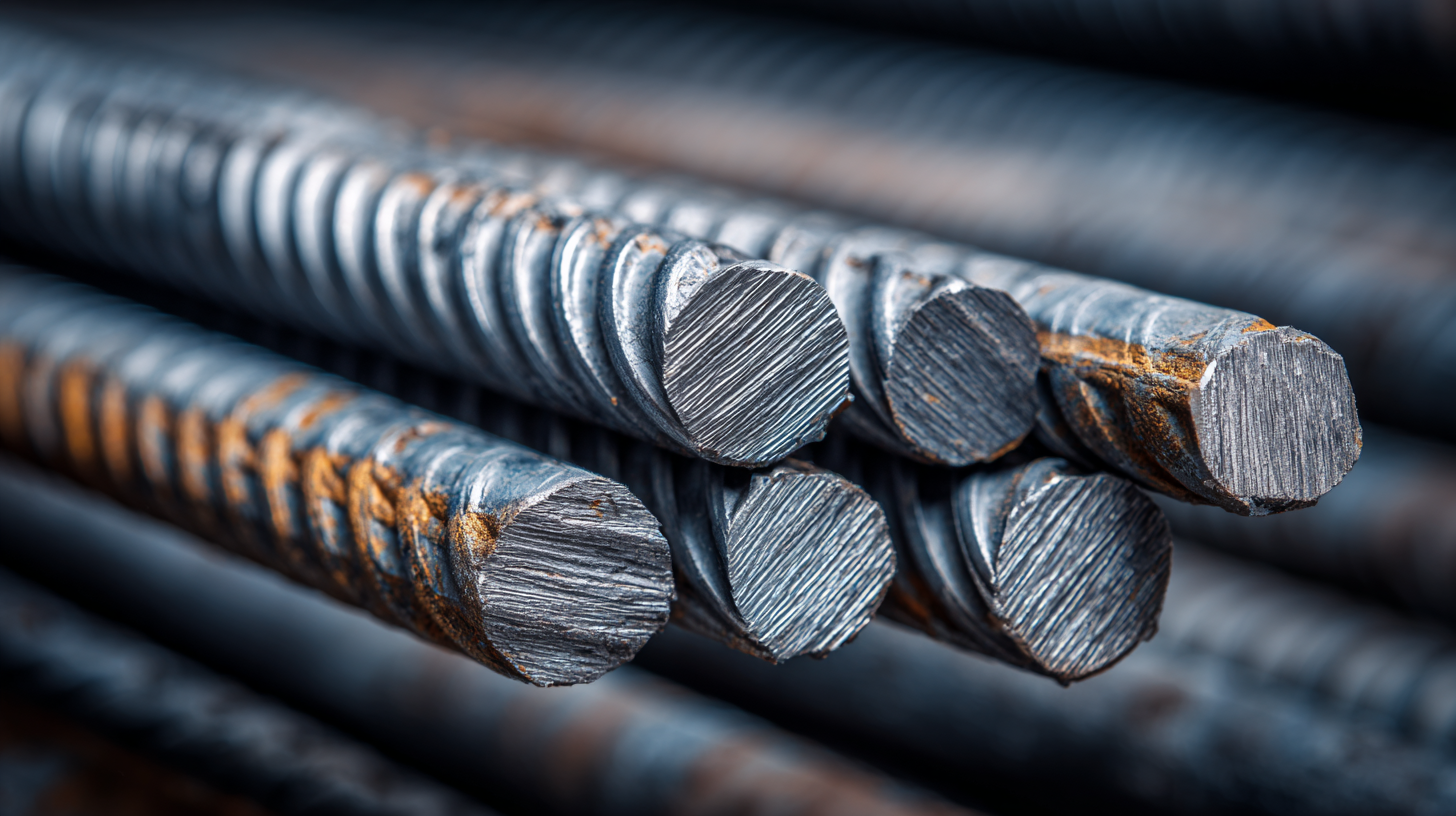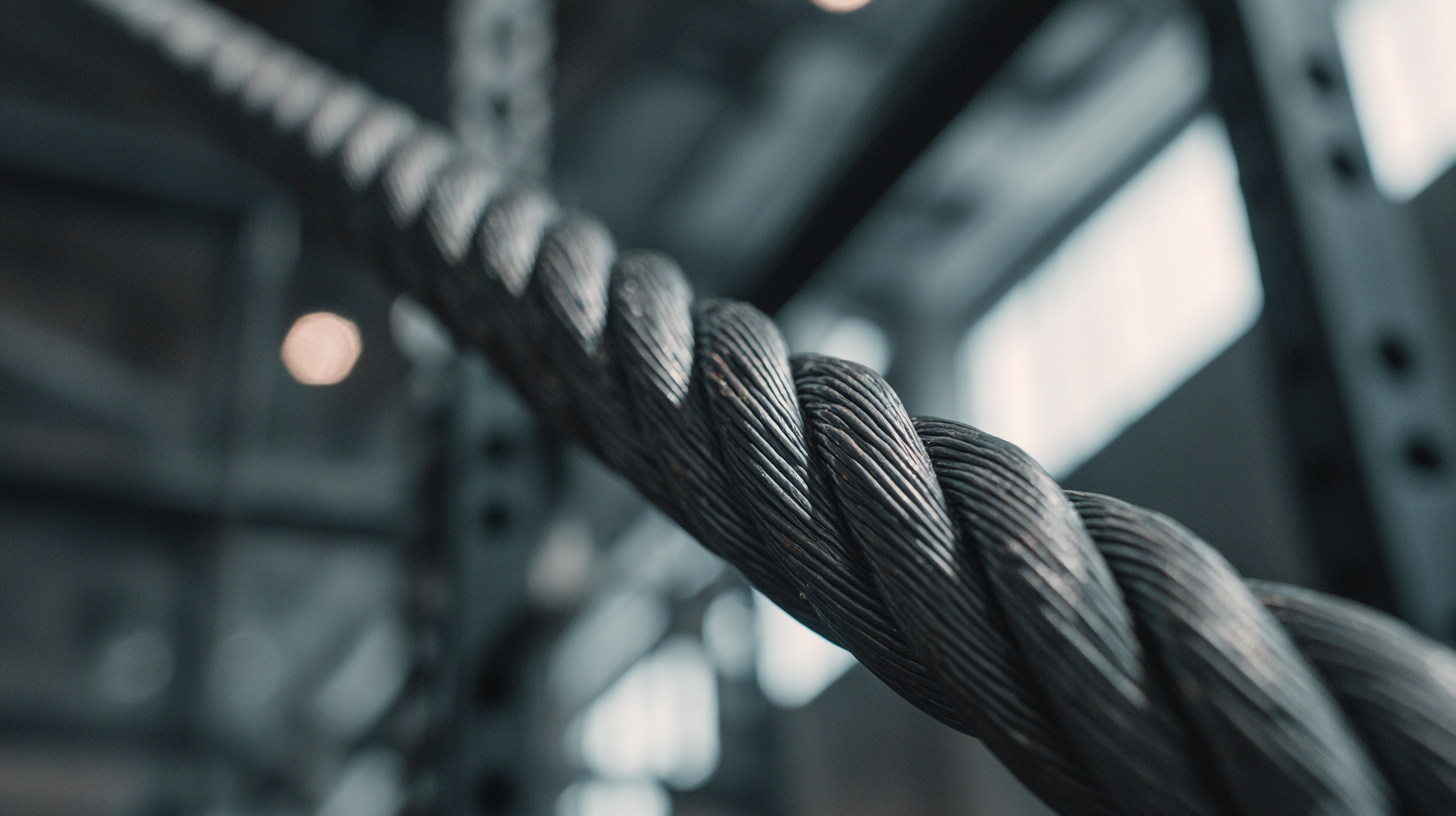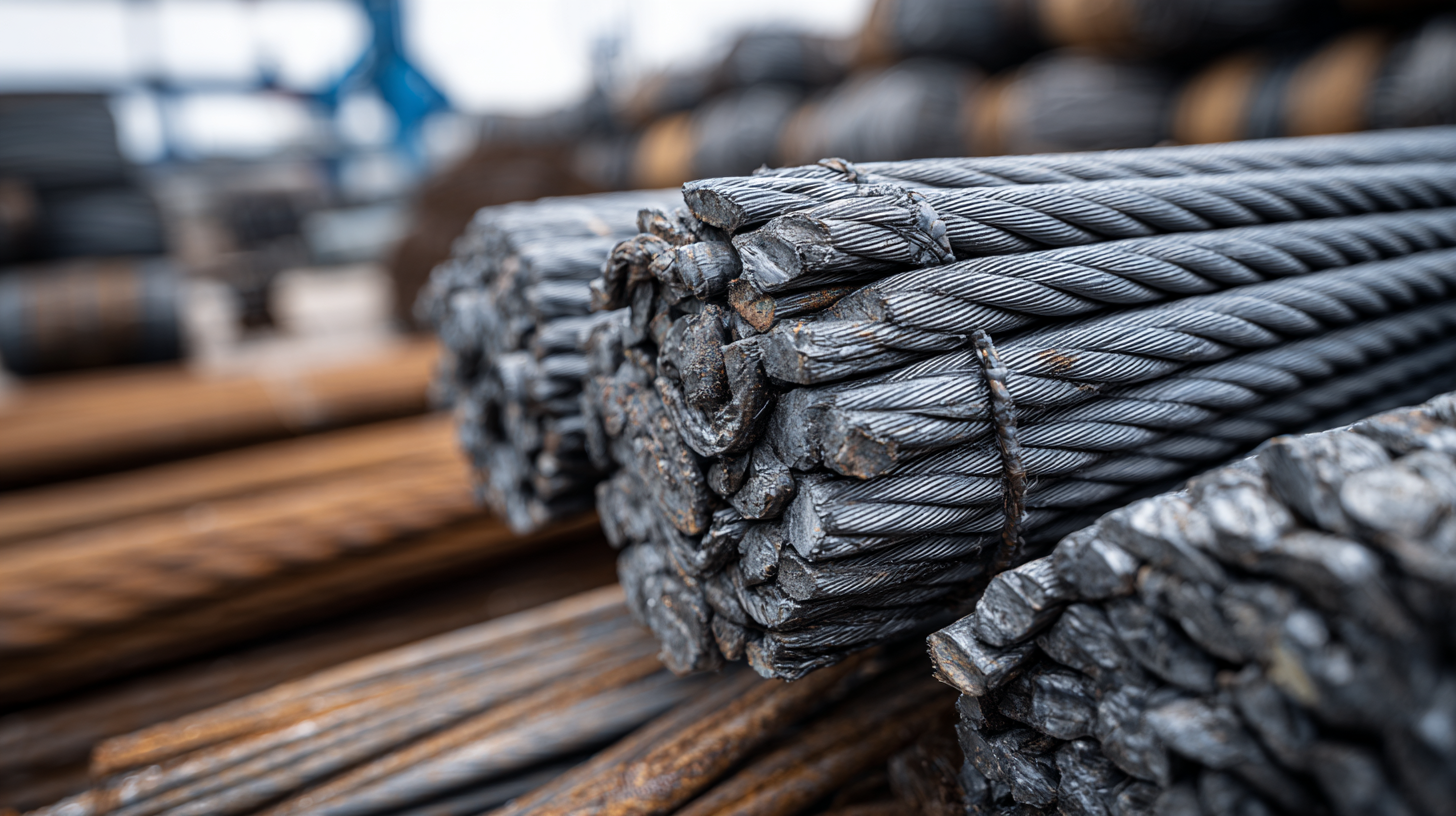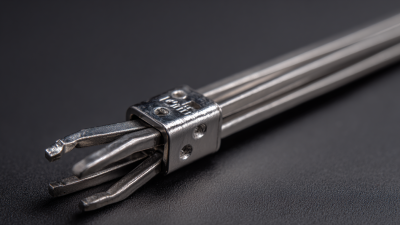7 Best High Tensile Strength Solutions for Your Industrial Needs
Table of Contents
- Top 7 High Tensile Strength Materials for Industrial Applications
- 5 Key Benefits of High Tensile Strength Solutions in Manufacturing
- 3 Essential Tips for Selecting the Right High Tensile Strength Material
- 6 Common Industries That Rely on High Tensile Strength Products
- 4 Innovative Technologies Enhancing Tensile Strength in Modern Industry
- Innovative Solutions with China Wholesale Stainless Steel Cable Ties: L Type Coated Options for Every Application
- FAQS
- Conclusion
- Related Posts
These days, in the industrial world, there's a pretty big need for materials that can handle extreme conditions — it's almost a must-have. That’s why High Tensile Strength solutions are becoming super important for manufacturers. At Wenzhou Daren Electric Co., Ltd., we're really focused on making cold-punching automatic molds and tooling fixtures. We’re always pushing for innovative designs and smarter production methods to meet these tough demands. Our team’s got solid expertise in product and mold design, which helps us create high-quality solutions that are custom-made for industries where durability and strength really matter.

In this blog, I want to share with you the 7 top High Tensile Strength solutions out there, showing how they can really boost efficiency and last longer — even in the toughest environments. Whether you're looking to upgrade what you’ve got or explore some really advanced tech to stay ahead, understanding these options is key if you wanna stay competitive these days.
Top 7 High Tensile Strength Materials for Industrial Applications
When we're talking about industrial stuff, picking the right materials with high tensile strength is super important if you want things to last and perform well under stress. I came across a report by Allied Market Research that says the global market for high-strength materials is expected to hit around 39 billion dollars by 2027, growing at about 7.9% annually. That’s mainly because everyone’s looking for materials that can handle the tough conditions found in industries like construction, automotive, and more.
Steel alloys definitely steal the show here—especially the ones boosted with chromium and nickel. These additions not only make the steel stronger but also help it resist corrosion better. On top of that, materials like carbon fiber are really gaining popularity lately. They’re super lightweight but pack a punch in terms of tensile strength, which is why you see them in aerospace and car manufacturing a lot. I read a recent study in the Journal of Materials Science that said carbon fiber composites can have tensile strengths over 500 MPa—making them perfect when you need to save weight without sacrificing strength or safety.
7 Best High Tensile Strength Materials for Industrial Applications
5 Key Benefits of High Tensile Strength Solutions in Manufacturing
High tensile strength materials really make a big difference in manufacturing. They bring a lot of benefits, especially when it comes to making production smoother and products more durable. One of the biggest perks? Safety. These materials are less likely to crack or fail when under stress, which means fewer accidents on the job and less downtime for equipment. That's a huge deal, especially in fields like construction or aerospace, where structural integrity really matters.
Plus, using high tensile strength stuff can actually save you some serious cash down the line. Since these materials don’t need to be super thick or heavily reinforced, you end up spending less on raw materials. Shipping and handling costs drop too. And, because products built with these materials tend to last longer, there’s less need for repairs or replacements — which keeps things running smoothly overall. So, basically, including these advanced materials in manufacturing doesn’t just boost productivity; it also raises the quality of the final products, making everything more reliable and efficient.
3 Essential Tips for Selecting the Right High Tensile Strength Material
When you're choosing high-tensile-strength materials for industrial projects, there are a few key things you really want to keep in mind. First off, it’s all about understanding what your mechanical needs are. For example, according to a study by the International Journal of Mechanical Engineering, materials like high-carbon steel can have tensile strengths over 1000 MPa, which makes them great for heavy-duty stuff. On the other hand, polymers such as aramid fibers can actually reach around 3000 MPa but are super lightweight—pretty impressive, right? Getting a good idea of the types of loads and stresses the material will face helps you make smarter choices from the get-go.

Then, don’t forget to think about where the material will actually be used. Environmental factors like corrosion, temperature swings, or exposure to chemicals can seriously affect how well these materials hold up. The Materials Research Institute points out that materials like stainless steel or specific carbon fibers tend to do pretty well even in really harsh conditions, so picking something that’s compatible with the environment is a must. Lastly, it’s not just about performance — cost and ease of manufacturing matter too. Finding that perfect balance between a solid material and what's budget-friendly is often the way to go, especially when you consider industry standards and production methods. Overall, keeping these points in mind will help you pick the best material for your high-tensile needs without any headaches.
6 Common Industries That Rely on High Tensile Strength Products
The automotive world is really seeing a big boost in demand for high-strength materials, especially synthetic rubber. Why? Well, synthetic rubber has some pretty awesome properties—it's super resistant to wear and can handle high temperatures without breaking a sweat. That’s why more and more auto companies are choosing it for different applications. As cars get more advanced, with a focus on better performance and longer-lasting parts, the need for tough materials that can handle extreme conditions becomes more crucial than ever. This shift is likely to drive market growth pretty significantly, prompting manufacturers to get creative and step up their game in the automotive space.
If you’re a company looking to ride this wave, a good tip is to invest some serious effort into R&D—especially on creating new, improved synthetic rubber formulas. This way, you can develop products that not only meet existing industry standards but actually go beyond them. That gives you a real edge over the competition. Also, teaming up with automotive manufacturers through strategic partnerships can help ensure your high-tensile materials match their evolving needs. It’s all about mutual growth, right?
On top of that, it makes sense to diversify your product lineup. Think about different segments like electric vehicles or heavy-duty trucks. Understanding what each of these markets needs and tailoring your products accordingly can really boost your sales. Besides, it helps solidify your position in the industry as a go-to supplier for tough, reliable materials.
4 Innovative Technologies Enhancing Tensile Strength in Modern Industry
In today’s fast-changing world of industry, new technologies are really shaking things up — especially when it comes to making materials stronger. One big player here is additive manufacturing, which’s been a game changer, especially in aerospace and auto industries. What's cool about this tech is that it lets you make lighter parts that are still super tough. Plus, it’s a win for the environment since it cuts down on waste and allows the use of high-performance materials that are eco-friendlier.

And it’s not just about strength — there's also a real push toward greener building materials. With new tools like artificial intelligence and blockchain, construction practices are becoming smarter. These techs help choose better materials and streamline how things are made, leading to stronger, more sustainable options. As more industries jump on these solutions, it’s clear that the combo of tensile strength and tech innovation is going to shape the future of engineering and manufacturing in a pretty exciting way.
Innovative Solutions with China Wholesale Stainless Steel Cable Ties: L Type Coated Options for Every Application
In the fast-evolving landscape of industrial applications, the demand for reliable and versatile fastening solutions has surged, prompting innovative designs in products like stainless steel cable ties. Among these, the L type coated options stand out, providing excellent functionality across various environments. Constructed from high-quality materials such as 201, 304, and 316 stainless steel, these cable ties offer exceptional strength and resistance to corrosion, making them suitable for industries ranging from construction to marine applications.
One of the key advantages of L type coated stainless steel cable ties is their PVC coating. This coating not only enhances the durability of the ties but also allows them to withstand a wide temperature range from -80°C to 150°C, ensuring reliability in extreme conditions. The availability of different lengths, starting at 300 mm and above, makes them adaptable to a myriad of applications, catering to the specific needs of users. Furthermore, compatible tools such as C001 and LQA facilitate easy installation, significantly improving efficiency in work processes.
According to recent industry reports, the global market for stainless steel cable ties is projected to grow, fueled by increasing demand for safe and sustainable fastening solutions. With innovations like the L type coated options, manufacturers are setting a new standard for performance and functionality. As industries continue to seek out more robust solutions, these advanced cable ties exemplify the intersection of quality engineering and practical design.
FAQS
: The primary benefits include improved safety, cost savings, enhanced durability, reduced maintenance needs, increased productivity, and better overall quality of end products.
These materials are less prone to fractures and mechanical failures under stress, which reduces workplace accidents and equipment downtime, especially in industries where structural integrity is critical.
Key factors include the specific mechanical requirements of the project, environmental conditions the materials will face, as well as cost and manufacturability.
High-carbon steel can be suitable for heavy-load applications with tensile strengths exceeding 1000 MPa, while aramid fibers, reaching around 3000 MPa, are lightweight and strong, making them ideal for specific applications.
Conditions such as corrosion resistance, temperature fluctuations, and exposure to chemicals play a significant role in determining the integrity and performance of these materials.
Key industries include automotive, construction, aerospace, and manufacturing sectors that require materials capable of withstanding extreme conditions and stresses.
The automotive industry is increasing its demand for materials like synthetic rubber, focusing on properties such as wear resistance and temperature stability to enhance vehicle performance and durability.
Companies can invest in research and development to create advanced formulations, form partnerships with automotive manufacturers, and diversify their product lines to meet different segment needs.
Balancing performance and economic feasibility is crucial, as it ensures that the selected materials meet industry standards while remaining viable for production and market demands.
By requiring less maintenance and replacement over time, high tensile strength materials contribute to overall operational efficiency, leading to reduced costs and improved production timelines.
Conclusion
In today’s world of industry, there’s a real surge in demand for materials with high tensile strength—people are looking for stuff that lasts longer and performs better in all sorts of applications. In this post, I’m going to take a look at seven of the top materials known for their incredible strength. We’ll see why they’re such a big deal when it comes to manufacturing, and I’ll also share five major benefits of using high tensile strength solutions—things like making things safer, cutting down on maintenance costs, and helping products last much longer.
Picking the right material isn’t something to take lightly, so I’ve put together three simple tips to help you make smarter choices, especially when considering the specific needs of your project and the environment it’s in. We’ll also explore six different industries that rely heavily on these powerful materials, proving just how versatile and essential they are across the board. Oh, and I’ll touch on some cool tech innovations that are boosting tensile strength in today’s industry. For example, companies like Wenzhou Daren Electric Co., Ltd. are really pushing the envelope with advanced design and tooling—that’s how they stay ahead of the game and meet the constantly evolving market demands.
Related Posts
-

Reliable Chinese Manufacturing for L Type Banding Clip Consistent Quality You Can Trust
-

How to Choose the Best Stainless Steel Ladder Ties for Your Projects
-

Solutions for Secure Cable Management: Exploring the Benefits of Customer Logo Self Locking Metal Cable Ties
-

Advantages of Using Best 316 Stainless Steel Cable Marker Tags for Your Business
-

Choosing the Right Manufacturer for Best Stainless Steel Banding Buckles with Effective Solutions
-

Unlocking Efficiency with Best Steel Pallet Strap Self Adhesive Strips Benefits for Global Buyers
Blog Tags:






